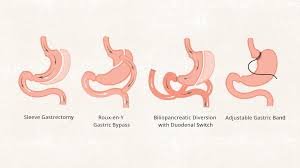Bariatric Surgery Recovery Tips for Long-Term Success
Bariatric surgery can be a life-changing step toward achieving significant weight loss and improving overall health. However, the journey doesn’t end when you leave the operating room. Recovery and long-term success depend on adopting the right habits, following your medical team’s guidance, and maintaining a healthy lifestyle. This guide provides essential bariatric surgery recovery tips to ensure you achieve lasting results and enjoy a healthier, more fulfilling life.
Understanding the Recovery Process
Recovery after bariatric surgery involves both physical healing and lifestyle adjustments. Most patients stay in the hospital for 1–3 days, depending on the type of surgery, and can gradually resume normal activities within a few weeks. The recovery period is also when your body adapts to new eating patterns and digestion changes. Proper preparation and adherence to recovery guidelines are crucial for minimizing complications and maximizing weight loss outcomes.
1. Follow Your Post-Surgery Diet Plan
Dietary changes are the cornerstone of bariatric surgery recovery. Your surgeon and dietitian will provide a phased eating plan, usually consisting of:
-
Liquid Diet: Clear liquids immediately after surgery to keep the stomach hydrated and allow healing.
-
Pureed Foods: Soft, blended foods introduced gradually to ease digestion.
-
Soft Solids: Foods that are easy to chew and digest.
-
Regular Foods: Gradually incorporating healthy, balanced meals as tolerated.
Tips for success:
-
Eat small, frequent meals throughout the day.
-
Chew food thoroughly and eat slowly to prevent discomfort.
-
Prioritize protein to support healing and maintain muscle mass.
-
Avoid high-sugar, high-fat, and carbonated beverages to prevent complications like dumping syndrome.
2. Stay Hydrated
Proper hydration is essential for recovery and overall health. Water should be consumed throughout the day, but it’s important to:
-
Sip slowly rather than drinking large amounts at once.
-
Avoid drinking fluids 30 minutes before and after meals to prevent overfilling the stomach.
-
Include electrolyte-rich fluids if recommended by your healthcare provider.
Dehydration can cause fatigue, dizziness, and slow healing, so staying hydrated is a top priority.
3. Take Prescribed Vitamins and Supplements
After bariatric surgery, nutrient absorption may be reduced, especially for procedures like gastric bypass or duodenal switch. Your doctor will likely recommend:
-
Multivitamins
-
Calcium and vitamin D
-
Iron
-
Vitamin B12
Tips for long-term success:
-
Take supplements consistently as prescribed.
-
Schedule regular blood tests to monitor nutrient levels.
-
Adjust doses with your healthcare provider if deficiencies arise.
4. Incorporate Physical Activity Gradually
Exercise plays a vital role in recovery and weight loss maintenance. Begin with light activity, such as walking, soon after surgery to prevent blood clots and improve circulation. Over time, incorporate:
-
Strength training to maintain muscle mass
-
Cardiovascular exercises for heart health
-
Flexibility exercises like yoga or stretching to improve mobility
Consistency is key. Even moderate daily activity can enhance weight loss, boost metabolism, and improve mood.
5. Monitor Your Weight and Progress
Tracking your weight loss and health milestones can help you stay motivated and detect potential issues early. Consider:
-
Keeping a journal of meals, activity, and weight changes
-
Using apps or devices to track progress
-
Sharing updates with your healthcare team for guidance and support
Monitoring progress helps you stay accountable and make adjustments as needed.
6. Seek Emotional and Mental Support
Bariatric surgery involves significant lifestyle changes, and emotional support is crucial for long-term success. Consider:
-
Counseling or therapy to manage body image, stress, or emotional eating
-
Support groups with other bariatric patients to share experiences and advice
-
Family and friends who encourage and participate in your new lifestyle
Mental and emotional well-being is just as important as physical recovery in achieving sustainable results.
7. Attend Regular Follow-Up Appointments
Follow-up appointments with your surgeon and dietitian are essential. These visits allow your healthcare team to:
-
Monitor healing and surgical outcomes
-
Track weight loss and nutritional status
-
Adjust dietary plans or supplements as needed
-
Address any complications or concerns promptly
Skipping follow-ups can increase the risk of nutritional deficiencies and slow your progress.
8. Avoid Common Pitfalls
To ensure long-term success, avoid habits that can undermine your results:
-
Overeating or grazing throughout the day
-
Consuming high-calorie, low-nutrient foods
-
Skipping protein-rich meals
-
Ignoring hydration or supplement requirements
Being mindful of these pitfalls can prevent weight regain and maintain the health benefits of bariatric surgery.
Conclusion
Bariatric surgery is just the beginning of a lifelong journey toward better health. Successful recovery and long-term weight loss require dedication to dietary changes, hydration, supplements, physical activity, emotional support, and regular medical follow-ups. By adopting these strategies and staying committed to your new lifestyle, you can maximize the benefits of bariatric surgery, improve your overall well-being, and achieve lasting transformation




